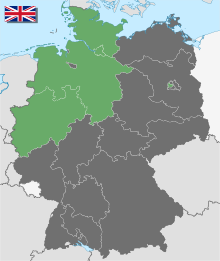| British occupation zone in Germany Britische Besatzungszone Deutschlands | |||||||||
|---|---|---|---|---|---|---|---|---|---|
| Military occupation zone of the British part of Allied-occupied Germany | |||||||||
| 1945–1949 | |||||||||
 Post-Nazi German occupation borders and territories from 1945 to 1949. British occupation zone (green) - Bremen and Bremerhaven consists of the two grey American exclaves in the British sector. | |||||||||
| Capital | Bad Oeynhausen | ||||||||
| Government | |||||||||
| Military governor | |||||||||
• 1945–1946 (first) | Bernard Montgomery | ||||||||
• 1947–1949 (last) | Brian Hubert Robertson | ||||||||
| Historical era | Cold War | ||||||||
| 8 May 1945 | |||||||||
| 5 July 1945 | |||||||||
• Disestablished | 7 October 1949 | ||||||||
| 12 September 1990 | |||||||||
| |||||||||
| Today part of | Germany | ||||||||
| |||||||||
The British occupation zone in Germany (German: Britische Besatzungszone Deutschlands) was one of the Allied-occupied areas in Germany after World War II. The United Kingdom, along with the Commonwealth, was one of the three major Allied powers that defeated Nazi Germany. By 1945, the Allies had divided the country into four occupation zones: British, Soviet, American and French lasting until 1949, whence the new country of West Germany was established. Out of all the four zones, the British had the largest population and contained within it the heavy industry region, the Ruhr, as well as the naval ports and Germany's coast lines.

